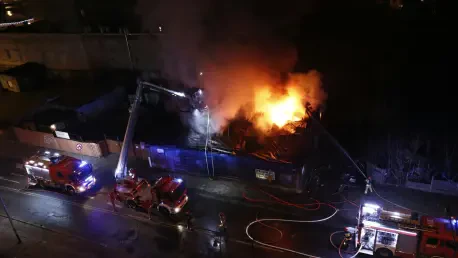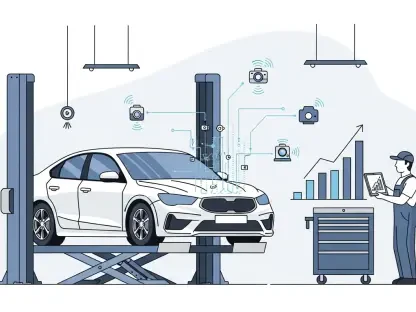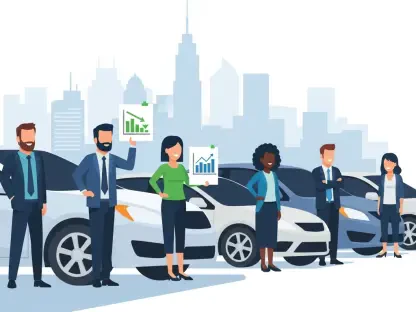In a distressing incident that has captured widespread attention, Faith, a New York woman known on social media platforms, found herself grappling with the aftermath of a severe collision involving her Toyota Corolla and a semi-truck. The accident left her vehicle with extensive damage, including a completely torn-off bumper, rendering it unusable for weeks. With no immediate solution in sight, Faith turned to her online community for guidance, torn between towing the damaged car to a mechanic, leaving it stranded at the site, or selling it as is. Her raw emotional plea highlights the chaos and uncertainty that often accompany such unexpected events, particularly when compounded by insurance complications. This situation serves as a stark reminder of the vulnerabilities drivers face on the road and sets the stage for a deeper exploration of the systemic and personal challenges tied to vehicular accidents in the absence of adequate protection.
A Devastating Collision and Its Fallout
The impact of the accident on Faith’s life cannot be overstated, as the collision with the semi-truck transformed her daily routine into a maze of frustration and difficult choices. Beyond the visible destruction to her Toyota Corolla, the incident stripped away her sense of security and mobility, leaving her stranded without a reliable means of transportation for an extended period. The financial implications loom large, with repair costs potentially running into thousands of dollars, and no clear path to resolution in the immediate aftermath. Her public expression of helplessness, shared through social media, resonates with countless others who have faced similar predicaments, illustrating the profound personal toll of such events. This case underscores how a single moment on the road can spiral into a prolonged ordeal, especially when the responsible party fails to uphold basic legal and ethical standards.
Compounding the physical and emotional damage is the uncertainty surrounding the next steps for Faith, who must navigate a complex web of decisions with limited resources at her disposal. Should the vehicle be towed to a repair shop, risking further expense with no guarantee of coverage, or left in place, potentially accruing additional fees or safety hazards? Alternatively, selling the car in its current state might offer a quick exit, but likely at a significant financial loss. Each option carries its own set of challenges, amplified by the lack of immediate support or clarity on how to proceed. This situation reveals a broader issue faced by many accident victims: the absence of a straightforward mechanism to address damages when standard protections fall short. Faith’s struggle serves as a poignant example of the real-world consequences that unfold when drivers are unprepared for the unexpected.
Uninsured Operators: A Hidden Threat on the Roads
A particularly alarming revelation in Faith’s case is the discovery that neither the semi-truck driver nor the associated trucking company held any insurance coverage at the time of the crash. This blatant disregard for state and federal mandates, which require commercial operators to maintain liability insurance, places an unfair burden on victims who are left to shoulder the costs of damages through no fault of their own. Without insurance to fall back on, Faith faces the daunting prospect of paying for repairs out of pocket, a financial strain that could have long-term repercussions. This issue exposes a dangerous gap in the system, where non-compliant operators evade accountability, leaving individuals to navigate the fallout alone.
The prevalence of uninsured commercial drivers is a growing concern that extends beyond this single incident, highlighting a systemic flaw in enforcement and oversight within the trucking industry. When companies or drivers fail to secure the required coverage, they not only violate legal standards but also jeopardize public safety, as the financial and emotional consequences ripple through the lives of those affected. For someone in Faith’s position, the absence of insurance on the other party’s side means that compensation for damages becomes a distant and uncertain prospect, often requiring protracted legal battles with no guaranteed outcome. This harsh reality emphasizes the need for stricter regulations and penalties to deter such negligence, ensuring that victims are not left to bear the brunt of others’ irresponsibility.
Understanding Insurance: Liability vs. Collision
One of the critical elements in Faith’s ongoing struggle is the realization that her own insurance policy lacked collision coverage, a gap that has significantly worsened her situation following the accident. Liability insurance, which is mandatory in most states including New York, is designed to cover damages caused to others in an accident where the policyholder is at fault. However, it offers no protection for the policyholder’s own vehicle, leaving Faith without a safety net to address the severe damage to her Corolla. Had collision insurance been part of her policy, the repair or replacement costs could have been covered regardless of who was responsible for the crash, providing much-needed relief in this challenging time.
This distinction between liability and collision coverage is a common point of confusion among drivers, often leading to devastating financial consequences when accidents occur. Many assume that basic insurance will safeguard their own property, only to discover after a collision that their policy falls short of such protection. For Faith, this misunderstanding has translated into a harsh lesson, as the absence of collision coverage means that her insurer cannot step in to mitigate the costs, forcing her to confront the full weight of the damages alone. This scenario serves as a critical reminder for all drivers to thoroughly review their policies and ensure that adequate coverage is in place to protect against unforeseen events, especially when dealing with potentially uninsured parties on the road.
Regulatory Shortcomings in the Trucking Sector
The legal framework surrounding commercial trucking is clear: companies must carry sufficient liability insurance to cover damages resulting from accidents involving their vehicles. Yet, as Faith’s experience demonstrates, some operators blatantly ignore these requirements, creating significant obstacles for victims seeking compensation. This non-compliance is not merely a breach of regulation but a profound failure that undermines public trust and safety on the roads. When trucking companies evade their obligations, individuals like Faith are left with few options, often facing the daunting prospect of lengthy legal proceedings to recover even a fraction of their losses, if any resolution is possible at all.
Addressing these regulatory shortcomings requires a multi-faceted approach, including stronger enforcement mechanisms to ensure that all commercial operators adhere to insurance mandates. The current gaps in oversight allow rogue companies to operate with impunity, placing an unfair burden on accident victims who must navigate a complex and often inaccessible system to seek justice. Beyond enforcement, there is a pressing need for greater transparency, such as public databases that allow drivers to verify a company’s insurance status in the aftermath of a collision. Until such systemic issues are resolved, stories like Faith’s will continue to emerge, highlighting the urgent need for reform to protect the public from the consequences of regulatory neglect within the trucking industry.
Community Support and Paths Forward
In the wake of the accident, Faith’s decision to share her story on social media sparked a wave of empathy and practical suggestions from viewers who understood the gravity of her situation. Many recommended reporting the uninsured trucking company to the United States Department of Transportation, a step that could trigger an investigation into the operator’s practices and potentially lead to penalties for non-compliance. Others advised pursuing legal action to seek damages, recognizing that such a path, while challenging, might be the only way to hold the responsible party accountable. These responses reflect a collective frustration with systemic failures and a shared desire to see justice served.
Additionally, some community members speculated that the trucking company might be concealing insurance coverage, urging Faith to conduct a thorough investigation into their claims of being uninsured. This suspicion points to a broader skepticism about the transparency of certain operators within the industry, where hidden policies or undisclosed affiliations could complicate victims’ efforts to secure compensation. The outpouring of advice and support underscores the power of community in times of crisis, offering Faith not only emotional solidarity but also actionable ideas to navigate her predicament. This collective response highlights the importance of public awareness and engagement in addressing the challenges posed by uninsured drivers and non-compliant companies.
Lessons Learned and Protective Measures
Reflecting on her ordeal, Faith has conveyed a powerful message to others: the importance of securing collision insurance cannot be overstated. Her experience illustrates how liability coverage alone is often insufficient, particularly in accidents involving uninsured parties who cannot or will not cover the resulting damages. Collision insurance, while optional, acts as a crucial safeguard, ensuring that policyholders are not left financially vulnerable when faced with unexpected collisions. This lesson is a wake-up call for drivers to reassess their own policies and prioritize comprehensive protection to mitigate the risks of similar situations.
Beyond individual preparedness, Faith’s story emphasizes the need for broader awareness about the protections available and the potential pitfalls of inadequate coverage. Educational initiatives could play a vital role in helping drivers understand the nuances of insurance options, empowering them to make informed decisions that align with their needs and circumstances. Additionally, advocating for stricter enforcement of insurance requirements in the commercial trucking sector remains essential to prevent future victims from enduring the same hardships. By taking proactive steps, both on a personal and systemic level, the likelihood of such insurance nightmares can be significantly reduced, offering greater security to all who share the roads.









